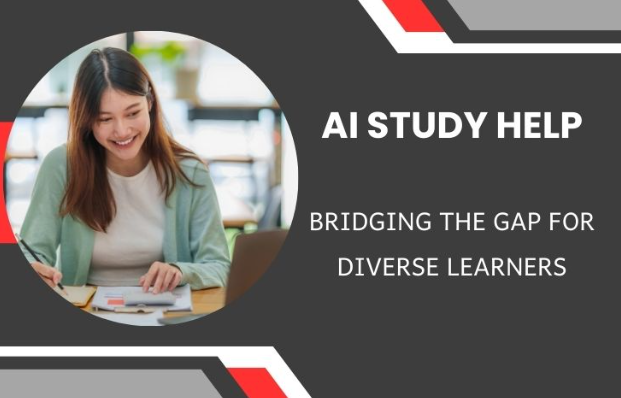Education is evolving at an incredible pace, and artificial intelligence (AI) is leading this transformation. Imagine a world where every learner, regardless of their background or learning style, can access personalized support tailored just for them. This isn’t the distant future; it’s happening now with AI study help tools designed to bridge gaps in understanding and accessibility.
As classrooms become more diverse, the challenges faced by students are also increasing. The beauty of AI lies in its ability to adapt and respond to individual needs, offering solutions that traditional teaching methods often overlook. From language barriers to varied learning abilities, AI has the potential to create an inclusive environment for all learners.
Curious about how AI study help can make a difference? Let’s dive into the various ways it’s reshaping education!
The Role of Artificial Intelligence in Education
Artificial intelligence is revolutionizing the education landscape. It functions as a powerful tool that enhances learning experiences for students and educators alike.
AI can analyze vast amounts of data, allowing it to identify patterns in student performance. This insight enables tailored educational resources that cater to individual needs. Instead of a one-size-fits-all approach, AI empowers personalized learning pathways.
Moreover, AI-driven applications facilitate real-time feedback for students. They can ask questions and receive instant answers, fostering an environment where curiosity thrives. Teachers also benefit from automated grading systems and administrative tasks, freeing up more time for direct interaction with their students.
In addition to enhancing engagement, AI tools can help bridge language gaps among diverse learners by providing translations or explanations in different languages. The result? Education becomes more inclusive and accessible than ever before!
Challenges Faced by Diverse Learners
Diverse learners face a myriad of challenges that can hinder their educational journeys. These obstacles often stem from differences in language, culture, and learning styles. For instance, students who are non-native speakers may struggle to grasp complex concepts presented in English.
Additionally, cultural backgrounds can affect how students engage with material or interact with peers and teachers. Some might feel disconnected from content that doesn’t reflect their experiences or values.
Learning disabilities add another layer of complexity. Students with ADHD or dyslexia may find traditional teaching methods ineffective for them, leading to frustration and disengagement.
Moreover, access to resources is not uniform across different communities. Many learners lack the support systems that others take for granted—be it tutoring services or technology tools tailored for diverse needs. This disparity creates significant barriers that require thoughtful solutions moving forward.
How AI Study Help Can Address These Challenges
AI Study Help offers tailored learning experiences for diverse learners by personalizing content. This means students receive resources that match their unique needs and learning styles.
Adaptive algorithms analyze student performance in real time. They identify strengths and weaknesses, allowing for immediate adjustments to the study material. This flexibility helps close knowledge gaps effectively.
Furthermore, AI-driven platforms provide instant feedback. Learners can engage with interactive quizzes and exercises that guide them toward improvement without waiting for a teacher’s response.
Language barriers also diminish through AI tools equipped with translation features. These solutions make educational resources accessible to non-native speakers, fostering inclusivity in classrooms.
Collaborative AI tools can connect students from diverse backgrounds, promoting peer-to-peer learning opportunities. By facilitating group studies or discussions online, these platforms encourage sharing of different perspectives and insights among learners.
Real-life Examples of AI Study Help in Action
Educational platforms across the globe are increasingly adopting AI study help tools to enhance student learning experiences. One notable example is a math tutoring app that uses machine learning algorithms to adapt its curriculum based on individual performance.
Users receive real-time feedback, allowing them to focus on areas where they struggle most. This personalized approach significantly boosts comprehension and retention of material.
Another instance comes from language-learning software which employs AI to analyze pronunciation. Learners can practice speaking while receiving immediate corrections, improving their fluency faster than traditional methods allow.
Then there’s an innovative reading program designed for students with dyslexia. It utilizes AI-driven text-to-speech capabilities that adjust pacing and voice tone, making reading more accessible and engaging for learners who often face challenges in this area.
These examples illustrate how integrated technology transforms educational practices, providing tailored support for every learner’s unique needs.
Potential Benefits and Drawbacks of Using AI Study Help
AI Study Help offers numerous advantages for learners. It provides tailored resources that cater to individual strengths and weaknesses. This customization can lead to improved comprehension and retention of information.
Accessibility is another significant benefit. Students can access AI-driven tools anytime, breaking down barriers related to time or location. This flexibility empowers diverse learners who may struggle in traditional settings.
However, there are drawbacks to consider. Over-reliance on AI might hinder critical thinking skills. If students lean too heavily on technology, they could miss out on essential problem-solving experiences.
Privacy concerns also loom large. The data collected by these systems can be sensitive, raising questions about security and consent.
Balancing the benefits with potential pitfalls is crucial as education evolves alongside technology. Embracing innovation should come with caution and thoughtful implementation.
Implementing AI Study Help in Education Systems
Implementing AI Study Help in education systems requires careful planning and collaboration. Schools must first assess their unique needs, focusing on diverse learners. This ensures that AI solutions are tailored to specific challenges.
Training teachers is crucial for successful integration. Educators need to understand how AI tools work and how they can augment traditional teaching methods. Workshops and continuous professional development will empower them to embrace technology confidently.
Additionally, schools should focus on data privacy and ethical considerations when introducing AI tools. Transparency with students and parents builds trust, making the transition smoother.
Pilot programs can serve as testing grounds before wider implementation. Feedback from students and educators during these trials offers valuable insights, allowing for adjustments that enhance effectiveness.
Fostering a culture of innovation encourages an open mindset towards new technologies within educational institutions. Embracing change helps create environments where all learners thrive with the support of AI study help options like those at SolutionInn.
Summary
The integration of AI Study Help at SolutionInn is transforming the educational landscape, especially for diverse learners. Artificial intelligence offers tailored support that meets individual needs, addressing various challenges faced by students from different backgrounds.
These challenges often include language barriers, varied learning styles, and differing levels of prior knowledge. AI can analyze these factors and provide customized resources or exercises to help bridge gaps in understanding.
Real-life applications illustrate this potential well. For instance, platforms utilizing AI can adapt content based on a student’s progress and preferences. This personalized approach not only keeps students engaged but also fosters confidence as they tackle subjects at their own pace.
While there are numerous benefits to implementing AI Study Help—like increased access to resources and enhanced learning experiences—it’s important to consider potential drawbacks too. Issues such as data privacy concerns and the need for adequate training for educators should be addressed carefully.
The successful implementation of AI Study Help requires collaboration among educators, technology developers, and policymakers. By working together, we can create an inclusive environment where all learners have access to the tools they need to succeed academically.
With its ability to offer targeted assistance like never before, the future looks promising for education enriched by artificial intelligence. Diverse learners stand at the forefront of this transformation—ready to engage with materials designed just for them.


